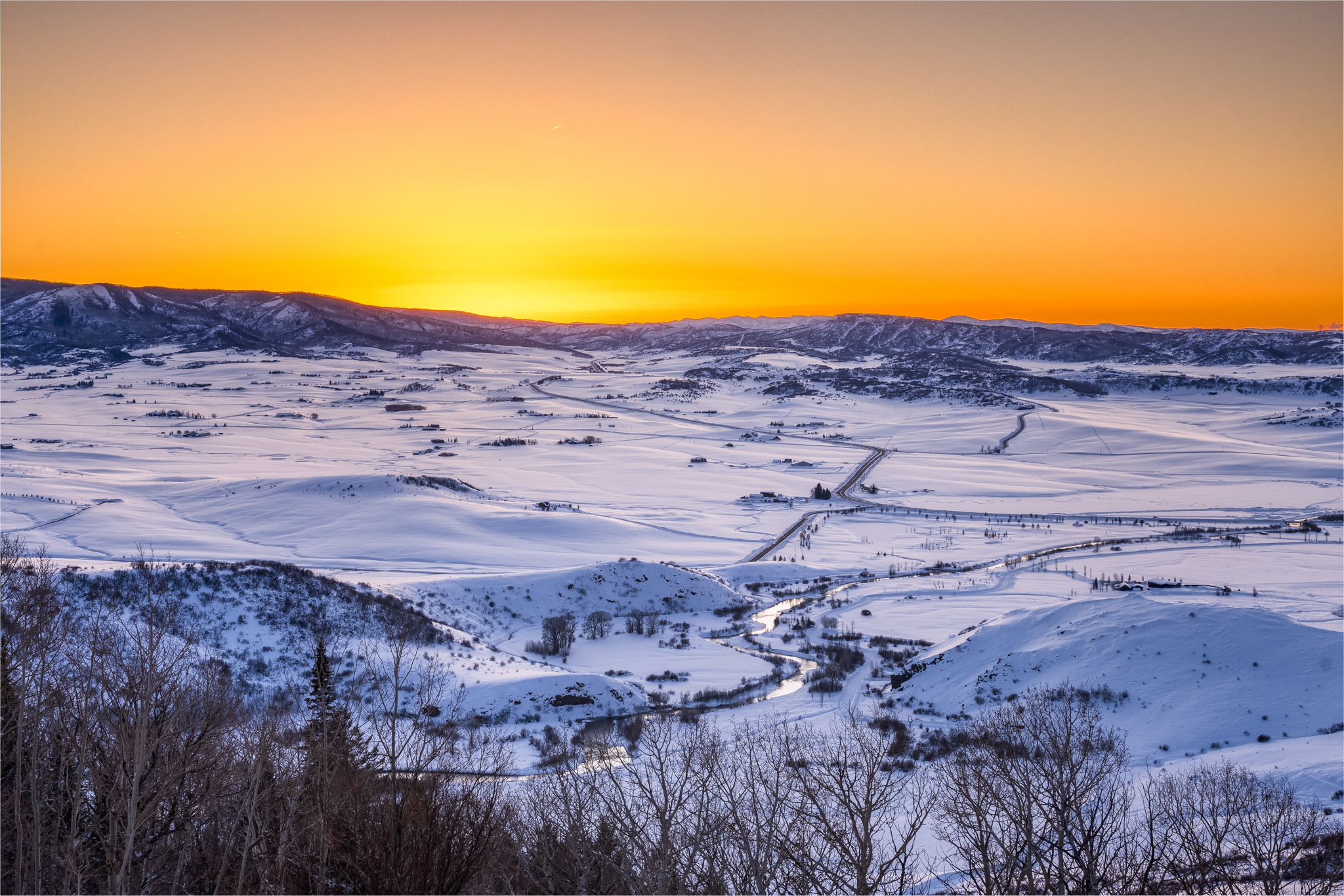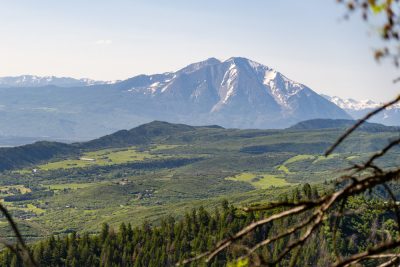by LWP Staff
“Colorado is the gateway to the Mountain West,” says Brian Hartley, Live Water Properties’ Associate Broker specializing in Colorado ranches for sale. “Here, ranching and recreation co-exist harmoniously to create an unparalleled lifestyle.”
It’s no wonder that the two pursuits go together like hand in a glove, be it leather work gloves or insulated ski gloves, because they evolved together. World-famous ski towns, including Telluride and Aspen, got their start as mining boomtowns in the mid-to-late 1800s. Skiing predated Colorado statehood in 1876, but in the early days it provided practical winter transportation for the miners seeking fortunes among the peaks.
Texas drovers first brought Longhorns to western Colorado ranches to fatten on the abundant native prairies. As the mining towns boomed, cattlemen moved into the surrounding valleys to meet the miners’ ever-growing demand for beef.
By 1914, skiing had officially begun to leave its utilitarian roots and become a recreational pursuit. In that year, Howelsen Hill, which is now the longest continuously operating ski area in the country, opened. Twenty-five years later, the state’s first ski lift opened near Gunnison.
Over time, the ski resort industry began to attract winter sports enthusiasts from around the world and became a major economic force in the state. (Today, the economic impact of snow sports on the state exceeds $1 billion annually.) As a result, state leaders developed infrastructure including airports and well-maintained all-weather roads to support the burgeoning industry with the goal of making coming and going easy.
Through the years, ranching families continued to take advantage of the rich productivity of the valleys and the alpine meadows to raise healthy protein. As a benefit of their stewardship, working lands remained open providing habitat for wild game and flowing streams for angling.
In the places where private land abuts federal and state-owned land, the opportunities are amplified.
“If I were forced to choose one word to describe Colorado’s outdoors lifestyle, it would be accessible,” states Hartley, who has specialized in recreational Colorado ranches since 2006. “Outdoor experiences of all types are available around every corner, behind every tree and over every hill.”

Advantages of the Centennial State
Accessibility is one of the things that sets Colorado apart from other mountain states. The Centennial State boasts 12 commercial airports and nine of them are west of Denver. Many of the airports also provide private jet service.
“Because the transportation infrastructure was largely built to access the resort-anchored valleys, it’s as easy to get to Colorado as it is to get to most major cities,” Hartley says. “With direct flights from most major markets, owning a ranch in Colorado is convenient. The less time you spend on connecting flights and long drives between the airport and the ranch, the more time you’ll have to enjoy the land with your friends and family.”
“The state’s commitment to safe travel throughout the year benefits our ranch owners,” Hartley says. “As an added bonus, it makes coming and going to your favorite resort town easy.”
While many of the resort towns trace their beginnings back to mining camps, each has developed its own singular personality over time. For instance, Aspen is known for its luxe flavor while Breckenridge is home to a vibrant party scene while Telluride conjures up the spirit of the Old West.
“When I introduce clients to the Colorado ranches that I have listed or have discovered, I act as a matchmaker, too,” Hartley explains. “Buyers and their families have different personalities and distinct interests, so they may be more at home in one area than in another.”
To be as knowledgeable as possible, Hartley and his wife spend their weekends with their two young sons in tow exploring the different communities as well as the outdoor activities that the various areas provide. Hartley is an avid fly fisherman and wingshooter who also enjoys skiing, hiking, camping and other pursuits that keep his boys active and engaged in the outdoors.
“One of things that makes Colorado’s outdoor lifestyle possible is the weather,” he says. “The state, unlike some others in the Mountain West, enjoys an average of 300 days of sunshine. The humidity is low. That combination makes winter a wonderland.”
“I grew up in North Carolina and 25 degrees there, because of the humidity, feels much colder than a 10 degrees sunny day does here,” Hartley says. “And in the summer, air conditioning isn’t necessary up in the higher elevations, which is a big draw for people who are tired of the boiling summers in the South and Texas.”
Colorado is also blessed with four distinct seasons, each of which brings a new array of activities. Spring is a chance to enjoy nature’s reawakening as the green wave makes it way up the mountains. Summer is chockfull of hiking, mountain biking, camping, rafting, kayaking and horseback riding. Fall provides its own unique angling opportunities and exceptional big game hunting. Winter, of course, brings snow sports ranging from downhill and cross-country skiing to snowmobiling, snow shoeing and ice skating.
“It’s a rare place where you can be on your ranch working cattle in the morning and on the ski slopes or testing your angling skills on a tailwater fishery in the afternoon,” Hartley says.
Considerations of Owning Colorado Ranches
 Owning a Colorado ranch is like owning a ranch anywhere in that it provides a tangible asset that delivers solid return on investment and irreplaceable memories. When considering purchasing one of the many beautiful Colorado ranches for sale, there are some things potential buyers need to know to enjoy all the benefits of land ownership.
Owning a Colorado ranch is like owning a ranch anywhere in that it provides a tangible asset that delivers solid return on investment and irreplaceable memories. When considering purchasing one of the many beautiful Colorado ranches for sale, there are some things potential buyers need to know to enjoy all the benefits of land ownership.
“Colorado’s land stewardship ethic is strong and is reflected in the state’s early adoption of conservation easements, a tool that lets landowners protect their land from development and preserve their natural land legacy in perpetuity,” Hartley expresses. “In addition to the federal tax credits that come with enacting a conservation easement, Colorado has state-level tax benefits.”
“Enacting a conservation easement also provides state income tax credits, but if the landowners don’t use those credits they can be sold on a secondary market. This dual market not only benefits landowners but speaks to the high value that state leaders and the public place on the natural landscape,” he says.
The state is home to a host of land trusts, who act as a landowner’s partner in conservation by holding the easement and ensuring its terms are upheld. Some such as Ducks Unlimited or the Rocky Mountain Elk Foundation have a multi-state focus, while others including the Colorado Cattlemen’s Agricultural Land Trust or Colorado Open Lands have a statewide reach and still others have a regional or local focus.
Their goals and objectives vary as well. Some concentrate on habit for specific species, others focus on a geographic area or viewshed while others are mission-driven and strive to do things such as “keep working lands in working hands.”
“Conservation easements protect land in perpetuity, so it’s important that the landowners’ mission and goals align with that of the land trust they select,” Hartley expounds. “Like marriage, it’s a relationship that shouldn’t be entered into lightly.”
Ranches qualify for special property tax valuation. Agricultural tax valuation, which is based on the land’s productivity instead of its market value, is lower. To maintain the valuation, landowners must be actively engaged in agriculture, but for many that means enacting an annual grazing lease with an area rancher.
“Properties that haven’t already qualified for agricultural valuation may be eligible,” says Hartley, noting that many Colorado ranches already enjoy agricultural valuation. “Landowners will need to work with the local tax district to explore the requirements and then ensure their property meet the qualifications.”
In Colorado, just as in many states across the nation, water is an increasingly scarce and valuable resource. The Centennial State uses a system of senior and junior water rights to apportion and manage this life-giving liquid.
“Colorado, unlike many states, allows water rights to be freely transferred, so they can be sold separately from the land,” Hartley says. “This marketplace creates an opportunity to acquire additional water rights—for a price—for a property.”
He continues, “Because access to water is prime determinant of sustainability and long-term value, it’s critical that potential buyers work with an informed Broker to ensure that any ranch under consideration has this essential component.”
Of course, an informed, educated Broker is the key to making a dream property a reality. “I encourage anyone who loves the outdoors to explore the myriad of Colorado ranches for sale,” Hartley says. “They are as different as the people who seek to live life full tilt and on their own terms amid the rugged beauty and unmatched productivity of this rare place.”


